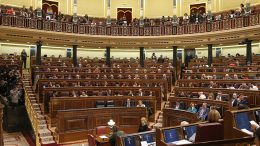Is It Time To Raise Salaries In Spain?
The PP and Ciudadanos reached an agreement to incorporate a “guaranteed wage supplement” in the package of measures which allowed Albert Rivera’s party to support Rajoy’s bid for a second term in office. (This measure would mean an increase in spending of more than 7.5 bilion euros over the next legislature). Meanwhile, Pablo Iglesias continues to fight for a rise in the minimum wage to 950 euros a month in 2020 – currently it stands at 655,20 euros.










